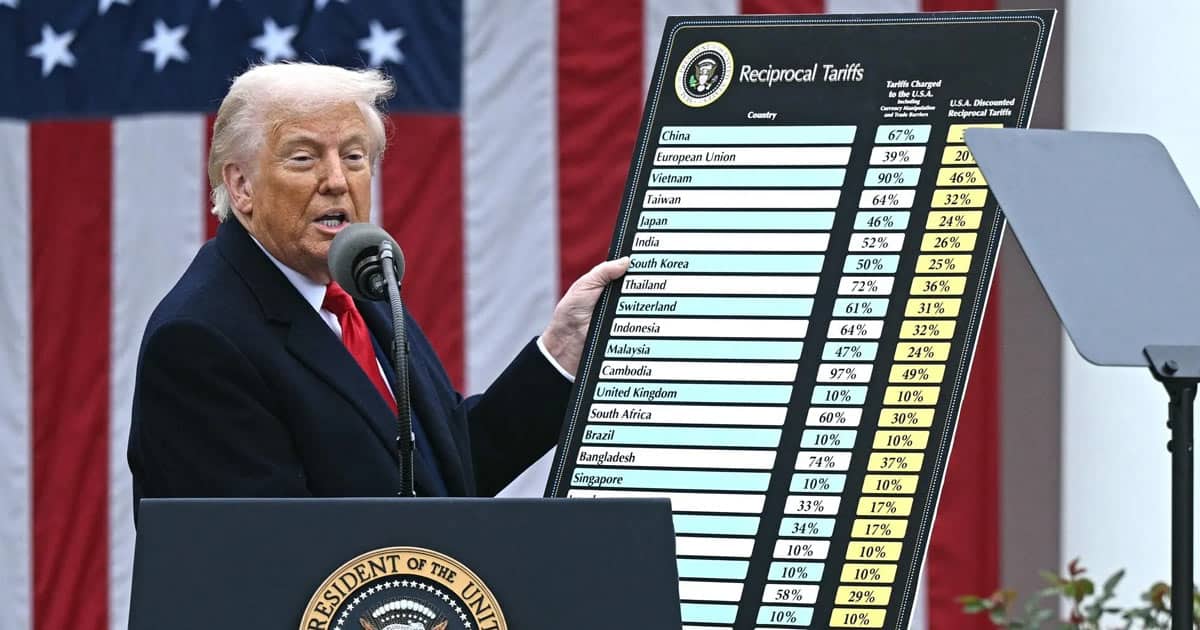President Donald Trump’s sweeping tariffs on foreign imports could slash the federal deficit by as much as $4 trillion over the next decade, according to a new estimate from the Congressional Budget Office (CBO).
The report, released Friday, said Trump’s global tariff hikes would generate enough additional revenue to reduce primary deficits by $3.3 trillion and cut federal interest payments by $700 billion.
That projected $4 trillion in savings would come even as negotiations with trading partners and international legal challenges continue over the new duties.
The CBO projection also highlighted that the added revenue from Trump’s tariffs would help counterbalance the effects of the Republicans’ tax-cut and spending bill passed earlier this year.
That legislation, scored by CBO as adding $3.4 trillion to deficits over the next ten years, had been a flashpoint for critics of Trump’s fiscal policy.
The U.S. debt currently stands at $37.18 trillion, according to Treasury Department data.
The number has ballooned under both Republican and Democrat administrations as Congress repeatedly authorizes more spending than revenue collected.
Lawmakers face a government funding deadline at the end of September, with the risk of another federal shutdown looming if appropriations bills are not passed.
Friday’s report marks a significant jump from June, when the CBO projected that Trump’s tariffs would reduce deficits by $2.5 trillion and cut interest outlays by $500 billion.
The updated forecast comes as tariff rates have steadily climbed.
Average U.S. duties on imports hit 16.7% in August, up from 15.1% in June, according to Oxford Economics.
So far this fiscal year, U.S. Customs and Border Protection has assessed more than $26 billion in duties, compared to just hundreds of millions in prior years.
The surge in tariff collections underscores Trump’s aggressive push to rebalance trade while using the additional revenue to chip away at Washington’s runaway debt.
The economic news came as Federal Reserve Chair Jerome Powell suggested Friday that the central bank could soon lower interest rates, sparking a surge on Wall Street.
In a speech Friday morning at the Jackson Hole Economic Symposium, Powell acknowledged that “the balance of risks appears to be shifting,” with inflation risks tilting upward but employment risks moving downward.
He hinted that the Fed may soon adjust its policy stance, with upcoming decisions left to the Federal Open Market Committee (FOMC).
The remarks sent markets soaring.
The Dow Jones Industrial Average jumped 903 points (2%) to a record high, while the S&P 500 gained 1.6% and the Nasdaq Composite climbed nearly 2%, according to CNBC.
Powell said the Fed’s framework “calls for us to balance both sides of our dual mandate,” but he cautioned that inflation remains a factor.
President Trump has frequently blasted Powell for waiting too long to act.
In a Tuesday post on Truth Social, Trump declared that “there is no inflation, and every sign is pointing to a major rate cut.”
“Could somebody please inform Jerome ‘Too Late’ Powell that he is hurting the Housing Industry, very badly?” Trump wrote.
“People can’t get a Mortgage because of him. ‘Too Late’ is a disaster!”
Trump has consistently argued that aggressive interest rate cuts, paired with his tariff-driven trade strategy, are key to unleashing economic growth while reducing the deficit.
With Friday’s CBO report, he now has fresh numbers to bolster his case that his America First economic policies are both pro-growth and fiscally responsible, in stark contrast, he says, to Democrats’ tax-and-spend approach.
READ MORE – Hillary Clinton Faces Disbarment in Arkansas Over Anti-Trump Russia Hoax

Our comment section is restricted to members of the Slay News community only.
To join, create a free account HERE.
If you are already a member, log in HERE.